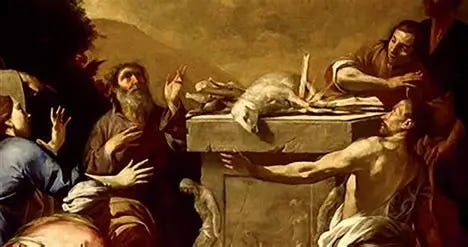I think some of the hardest to grapple with questions about Judaism come not from external sources, but from the Torah itself. I want to focus on one of those: korbanos, the Biblical commandments to bring and then slaughter animals at the Temple.
We know not all sacrifices were the same, nor were they brought for the same purpose. Some were fixed: daily offerings, weekly Shabbat offerings, offerings for the new moon and festivals. Others were more situational: thanks offerings, purification offerings, or sacrifices brought to atone for sin.
But I think there are fundamental problems with the entire concept.
Imagine I just explained the idea of God to you for the first time - that He created the universe, transcends it, and really cares about how humans behave. Then I tell you that the way this infinite, all-powerful being wants us to connect with Him is by building altars, slaughtering animals, and burning them because well, He enjoys the smell. Apparently, God is really into the scent of burning calves.
For some, this might not be a problem at all. The Torah is clear: God accepts sacrifices, He finds the smell pleasing, and the Temple rituals are a major part of divine service. That’s the end of the discussion.
But for me, and I suspect, for many others this feels… strange. It goes against our modern understanding of what God is, and what God wants. Even for someone with deep faith, it’s hard to feel inspired by the idea of bringing a sacrifice.
And yet, large portions of the Torah are devoted to the details of these offerings. Beyond that, enormous sections of the Talmud are dedicated to the precise legal procedures of sacrifice, thousands of technical laws, yet they rarely, if ever, explain why sacrifices matter.
That absence of explanation opens the door for Biblical critics. They point out that animal sacrifice was a widespread form of worship across the Ancient Near East. This, in and of itself, isn’t suspicious. But coupled with the lack of a clear internal rationale, it starts to look like the Torah was simply borrowing rituals from the surrounding cultures, a detail that Bible critics use to point to human as opposed to divine authorship of the Torah.
Broadly speaking, there are four traditional Jewish approaches1 to this issue:
The Circular Option – As seen in Rashi and the Talmud: Sacrifices matter because God commanded them. Their effectiveness and meaning don’t require explanation beyond that.
The Kabbalistic Option – As taught by the Ramban and the Zohar: Sacrifices are metaphysically powerful. They create change in higher spiritual realms, within the framework of the Sefirot.
The Symbolic Option – Articulated by the Abarbanel and Rabbi Samson Raphael Hirsch: Sacrifices are full of symbolism. They’re meant to awaken the human spirit, stir emotion, and teach moral or spiritual truths through action and ritual.
The Rational Option – Proposed most famously by the Rambam (Maimonides) and later by Rav Kook: Sacrifices were a historical concession. God, knowing the Israelites were surrounded by a culture steeped in sacrifice, allowed this form of worship to serve as a bridge. But the ultimate divine ideal would be a world without animal slaughter. Rav Kook even writes that in a future post-messianic era not only will we not bring animal sacrifices, but we will no longer eat meat of any kind.
Many are fine with the circular option, it is how they understand most of their religious experience anyways. The Kabbalistic option will only work for those who believe in/understand that framework. The symbolic option is nice, but it does not explain why God would need or want to use the sacrificial framework in the first place. To my mind the rational option is the only one that can hold its own weight against Biblical criticism, but it would require a sea change in how Orthodox schools teach their kids about the Torah.
I myself am not fully comfortable with accepting the purely rational approach. If God only wanted to use sacrifices as a bridge to connect with him without sacrifices why add all these extremely intricate laws? An even stronger critique would then be of the Talmudic sages, why waste so much time on the specifics of sacrificial law if the sacrifices were not to be brought again?
P.S.
As an experiment can you comment if you grasp the concept of animal sacrifices or not? And if you do, can you explain the rationale behind them.
I will try and do a part 2 going into the actual critiques brough,t as well as some more non-traditional understandings of animal sacrifices.
Obviously, keeping the explanations very short here.





I’m into the messianic veganism and while the Kookian way seems like the best of the bunch, I don’t really get it at all.
If there is an option to choose, I like the symbolic (3) and the rational (4) option the most. To me a mixture of the two seems the most likely. But I'm not a talmid chacham (is there such a thing as talmidas chachamah?:)), so my choice is only based on what speaks to me.